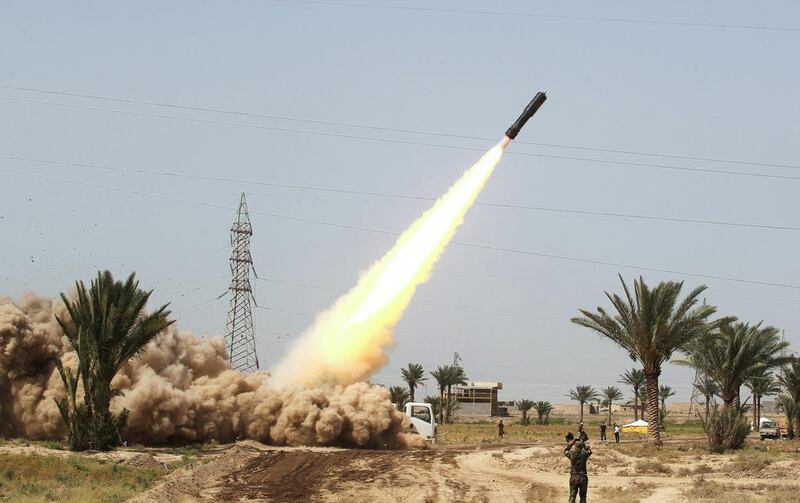BEIRUT // Iraqi forces pushing into Fallujah may face stiff resistance that slows their progress, but there is a general consensus that the city, captured by ISIL in early 2014, will be eventually retaken.
What comes next is more uncertain, and potentially more worrying.
The city 50 kilometres west of Baghdad has been an incubator for revolt and fertile ground for insurgency since the US invasion of Iraq and removal of Sunni dictator Saddam Hussein in 2003. Sunni-majority Fallujah saw frequent rebellions against US authority and served as a launching pad for insurgent attacks.
US military assaults to reassert authority in Fallujah left much of the city destroyed. More recently, in the year before ISIL’s capture of the city, Fallujah gave rise to an anti-government protest movement of Sunnis who believed members of their sect were being marginalised and abused by a government dominated by Shiites and influenced by Iran.
Governing Fallujah is something that eluded both the Americans and Iraqis after 2003. And once Iraqi government forces rid the city of ISIL, they will likely be faced with the challenge of trying to tame Fallujah once more.
“This is not the first time we’ve done this, so it’s a little bit Groundhog Day,” said Michael Knights, an Iraq expert with the Washington Institute for Near East Policy.
Much of the concern now over the future of Fallujah, beyond its post-2003 history, has to do with the role of Iran in the operation to retake the city. Iraqi special forces trained by the US are leading the charge but they are backed by fighters from the Popular Mobilisation Units, or Hashed Al Shaabi, a large grouping of primarily Shiite militias who some view as more bent on sectarian payback than unifying Iraq.
The most powerful of the Shiite militias are backed by Iran. Iranian advisers are also deployed in the field and Tehran’s master of its wars in the Middle East, General Qassem Soleimani, recently visited troops on the front line.
Members of the Shiite militias have been accused of revenge killings against Sunnis. After capturing other towns and cities from ISIL, they have frequently paraded mutilated corpses of their enemies and scrawled provocative Shiite slogans on the walls. To many, they are groups fighting for their sect, not the unity of their country.
The antagonistic nature of the militias is well known to the Iraqi government and the current plan is to keep them on the outskirts of Fallujah, assisting where they can and cutting off escape routes and ISIL reinforcements.
“As long as they are kept out of the city, it shouldn’t be too much of a problem,” said Mr Knights.
Government forces “need support in Fallujah and elsewhere, that’s just a fact”, said Renad Mansour, a fellow with the Carnegie Middle East Centre in Beirut. “But at the same time, we know that many of these paramilitaries are quite problematic.”
Phillip Smyth, an American researcher at the University of Maryland who focuses on the role of Shiite militias in Iraq and Syria, said the Popular Mobilisation Units can still antagonise Fallujah’s citizens, even from the city’s outskirts.
“They’ve still done these operations where they’ve shelled the living hell out of the city and people will remember that,” he said.
Even if the role of Shiite militias in the battle is muted and more palatable Iraqi military forces do the heavy lifting, retaking Fallujah and bringing calm will be a major test for a government that the city’s residents are unlikely to trust. Fallujah fell from Baghdad’s rule in the midst of a protest movement that was being violently suppressed by the Iraqi government. Outsiders being in control of the city and whatever destruction that comes with its capture may only serve to fuel animosity toward the state and create opportunities for ISIL to regain some kind of foothold.
“They don’t like outsiders very much in Fallujah – and outsiders are generally not very effective at policing in Fallujah,” said Mr Knights. “So we need to build an effective local security force … otherwise we’re going to find the city continually being reinfiltrated with ISIL.”
“It’s a place that ISIL – or Al Qaeda in Iraq before it – never really gives up on,” he added.
Iran’s heavy influence in Iraq is likely to continue well after the Fallujah operation is wrapped up. Just last week, the Iranian foreign minister signalled that Tehran would be involved in Iraq for the long haul, saying it would only leave when the government asked it to.
A continuing heavy Iranian presence will only make the delicate task of trying to win over Fallujah’s residents even more difficult.
The people of Fallujah “have real grievances that need to be addressed and hopefully not through military means”, said Mr Mansour.
jwood@thenational.ae





